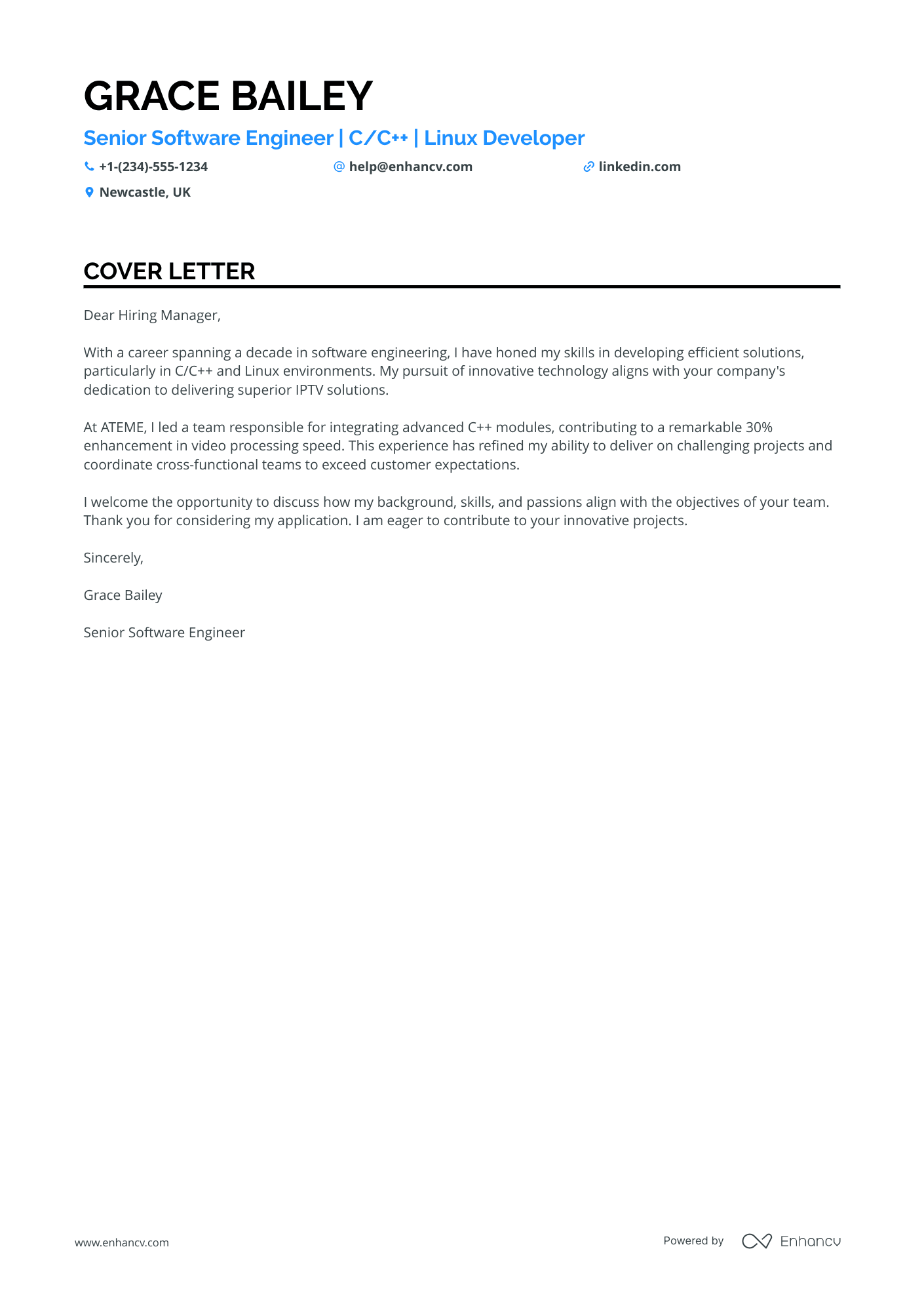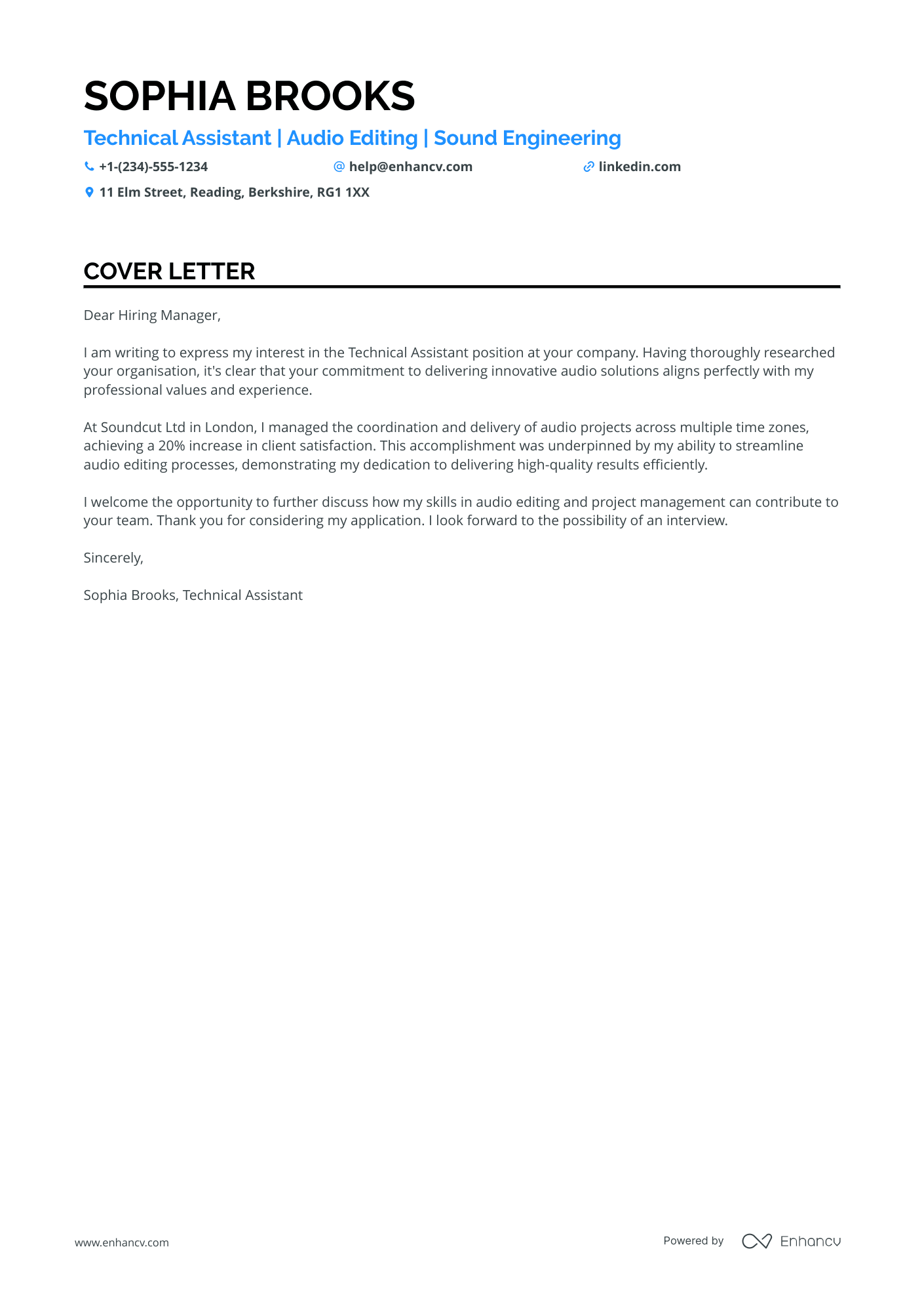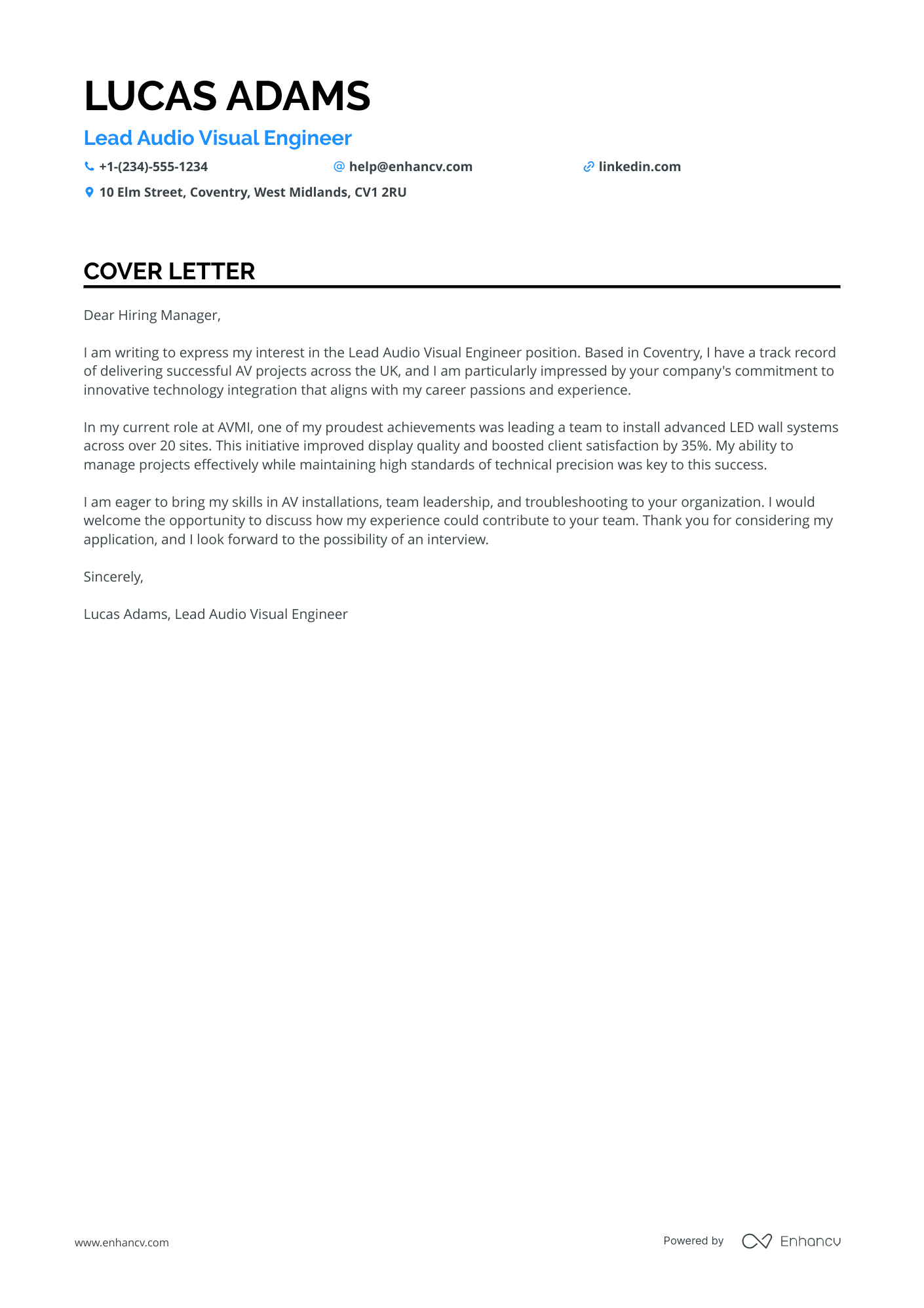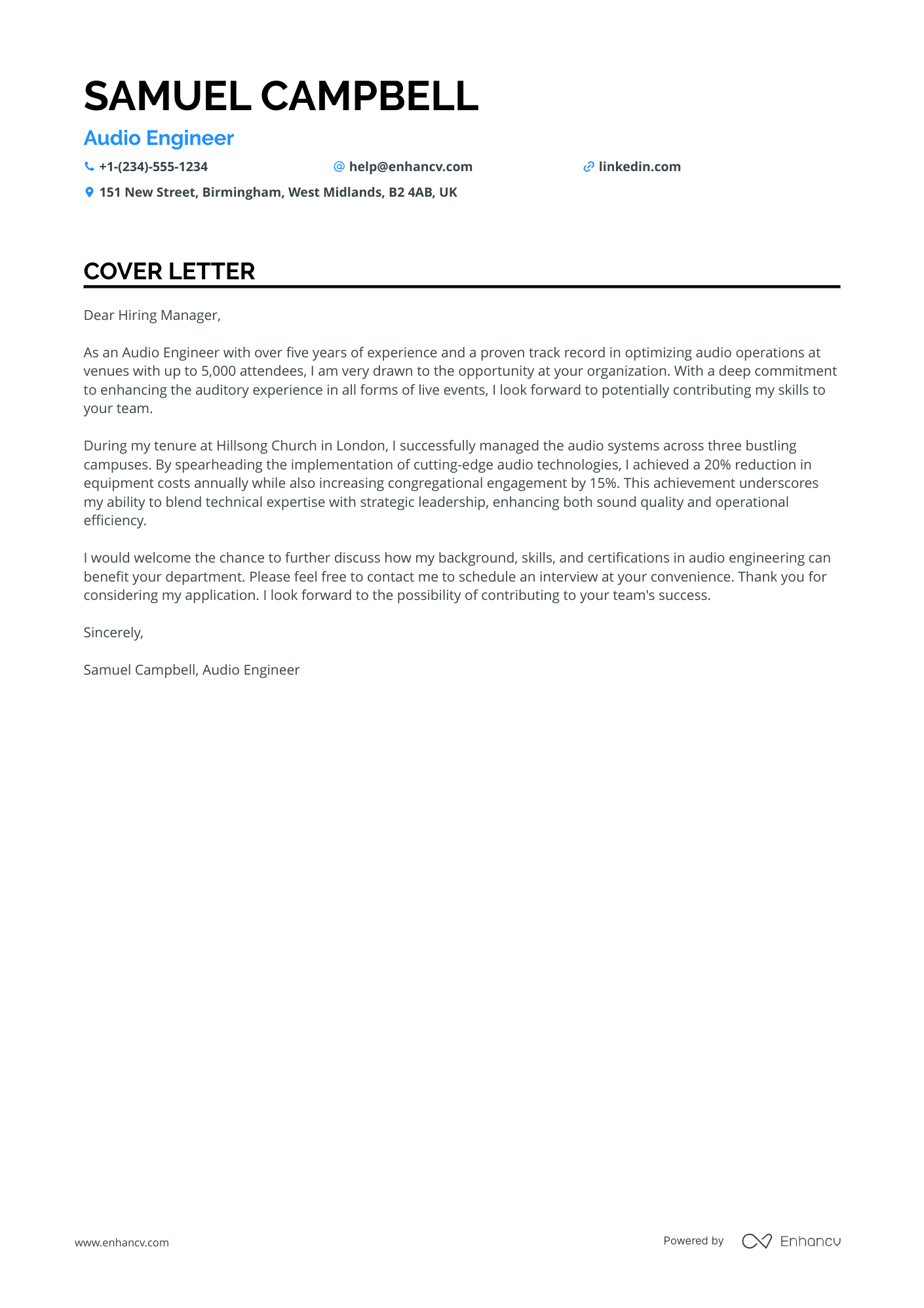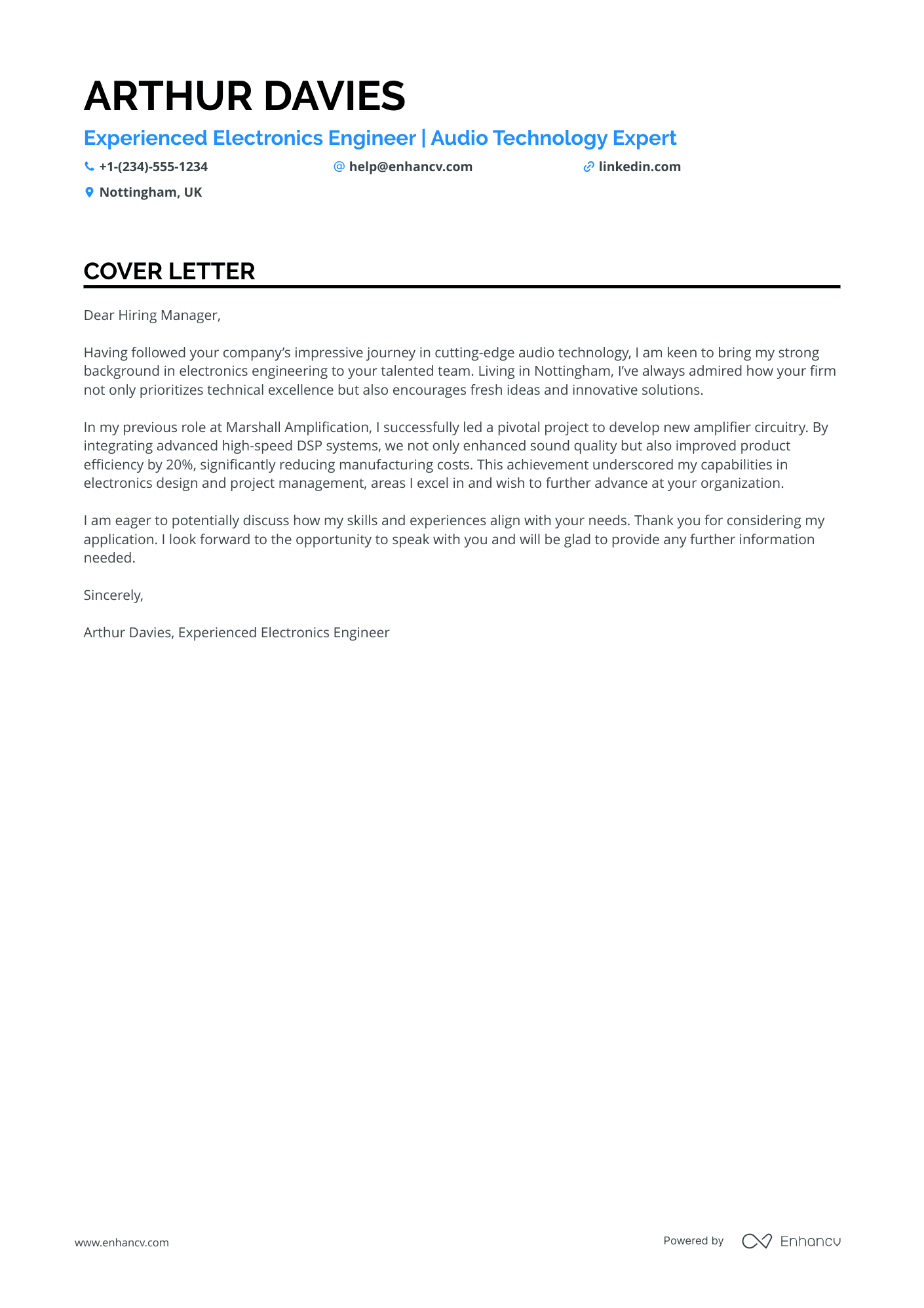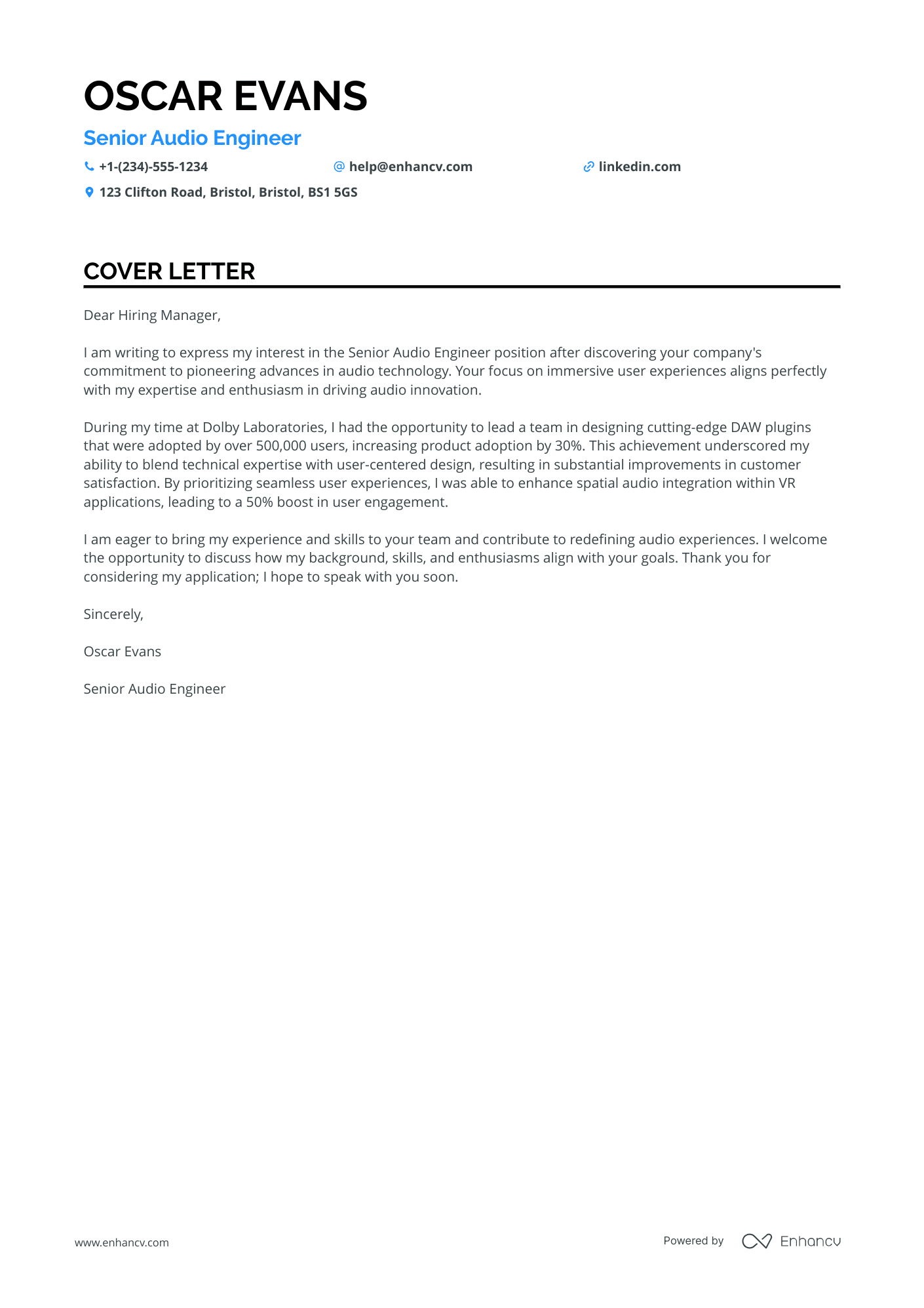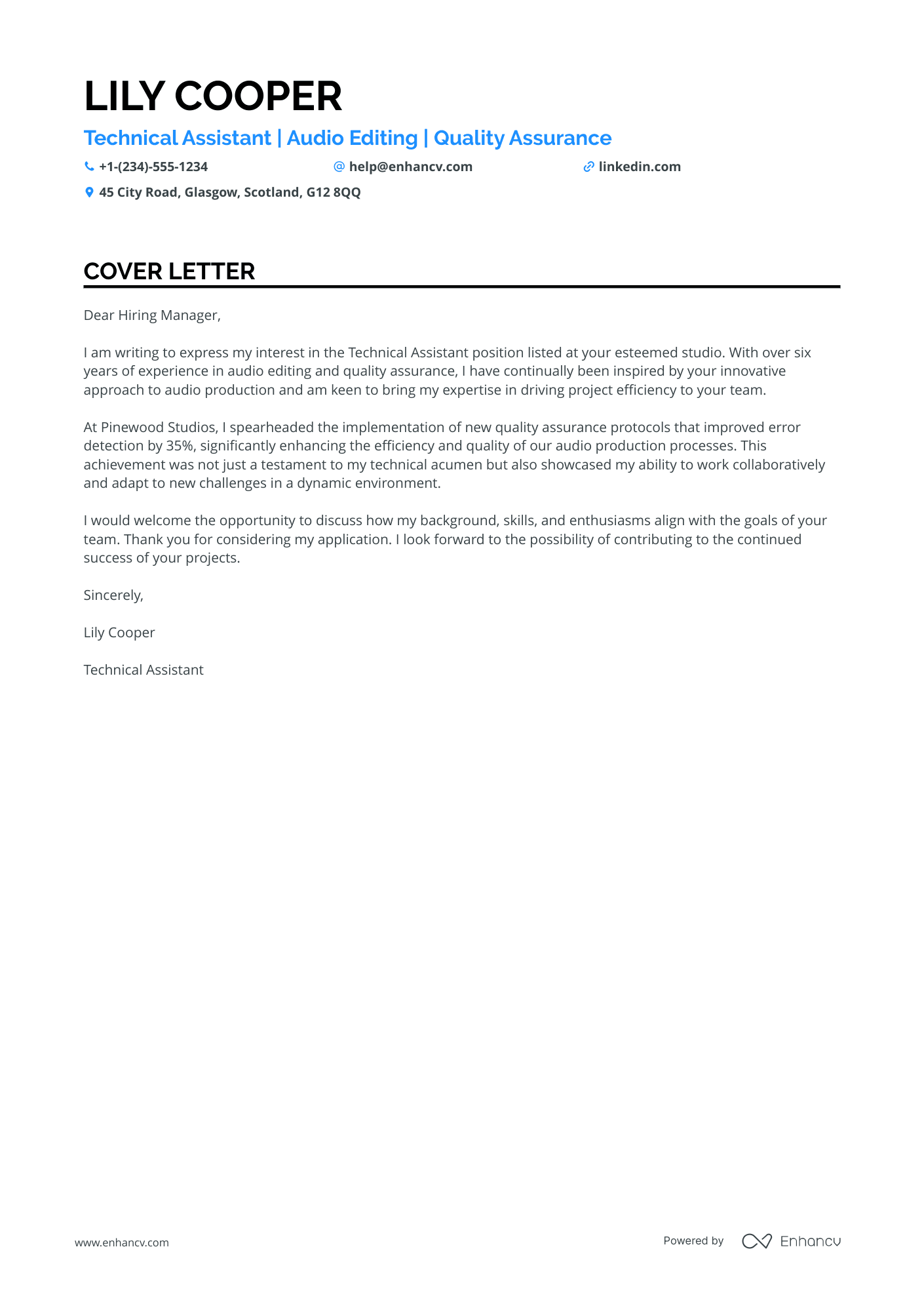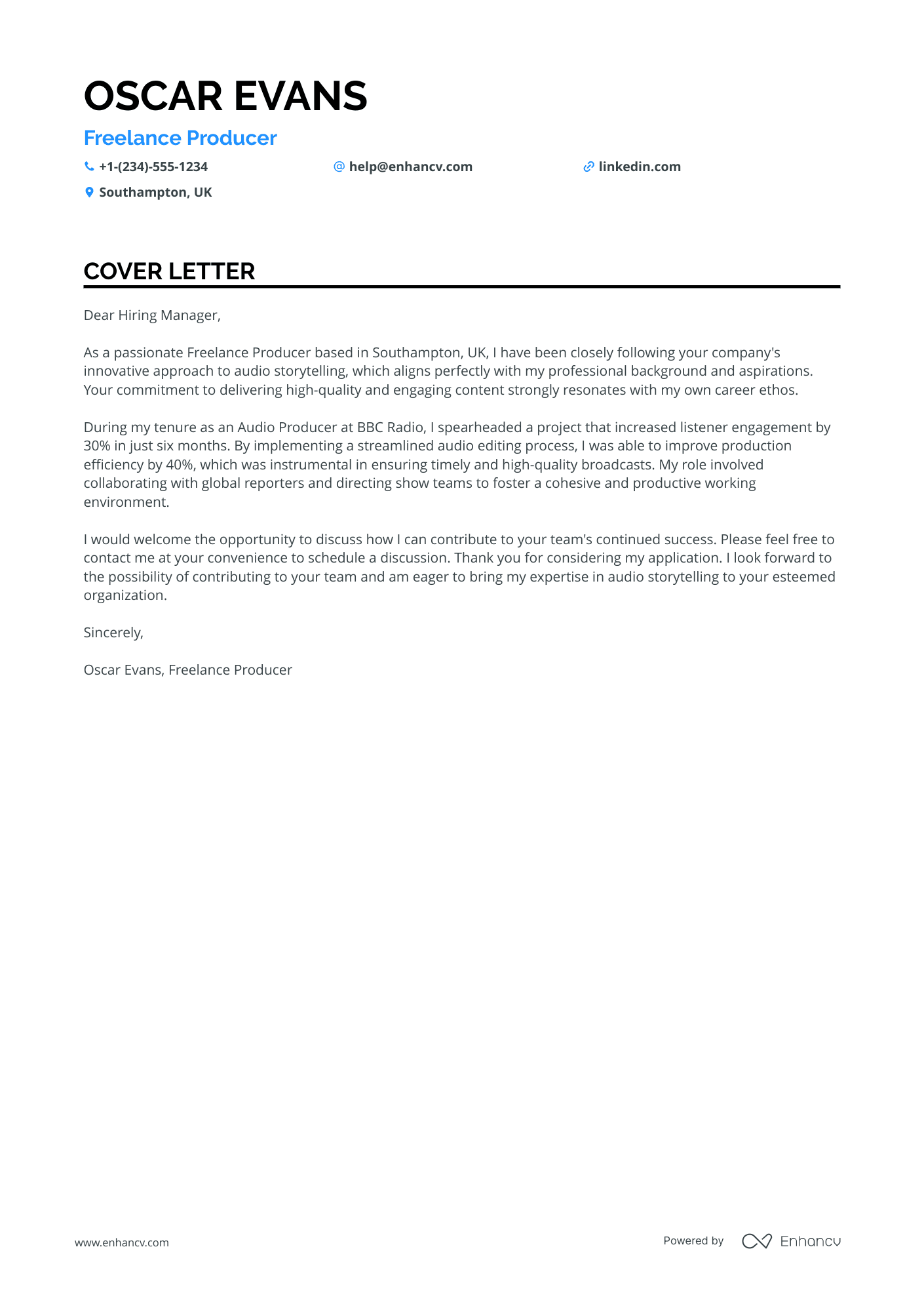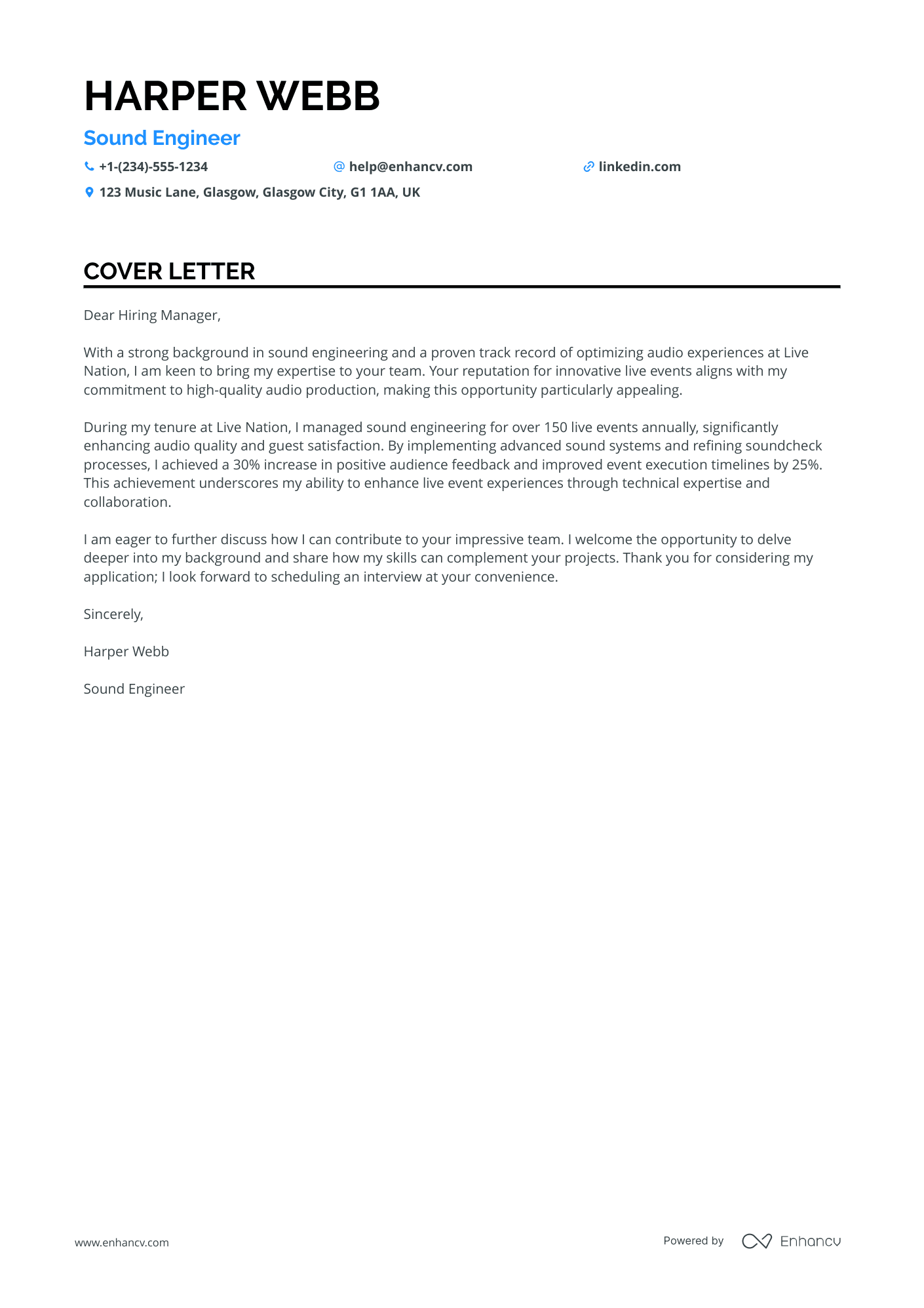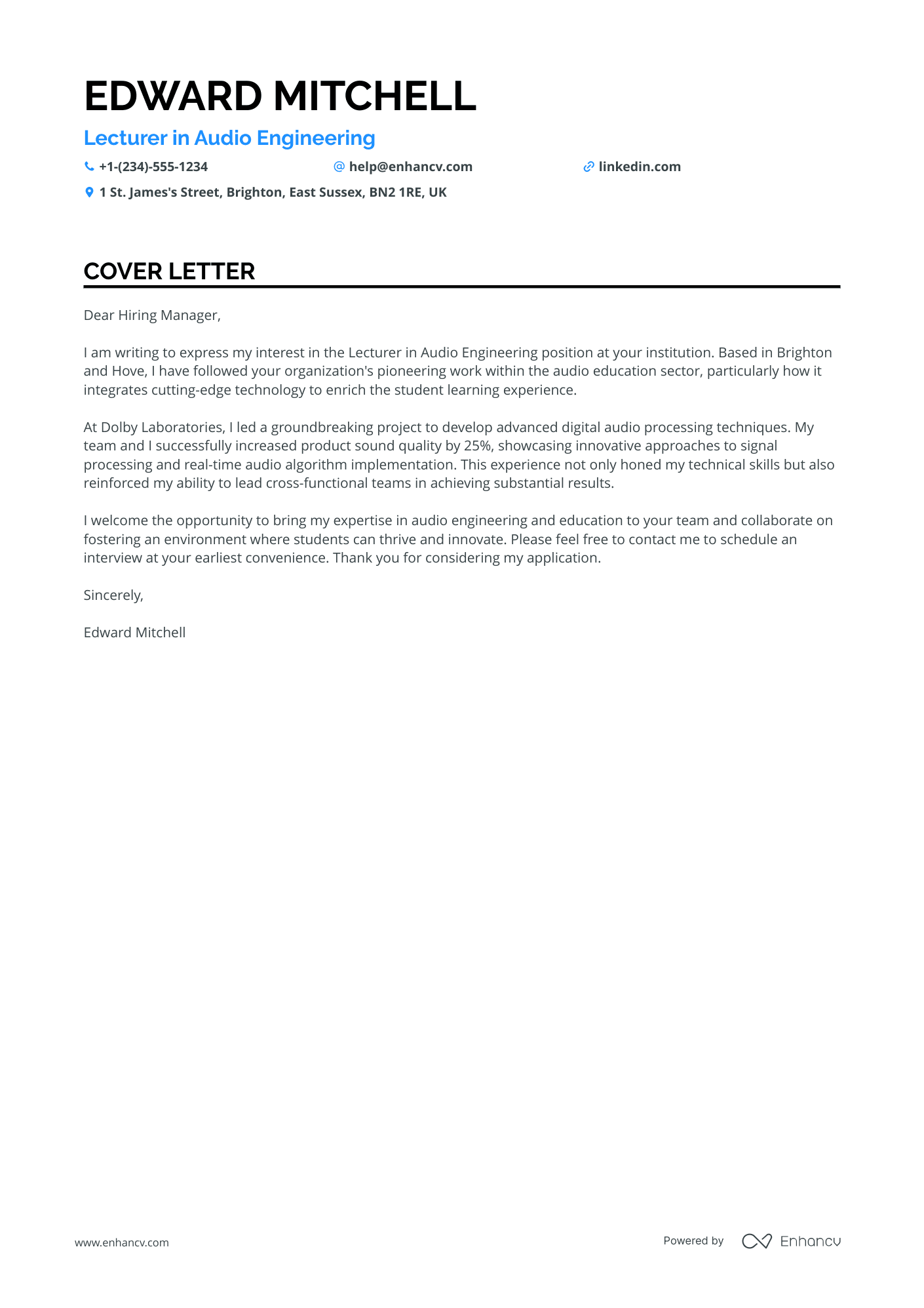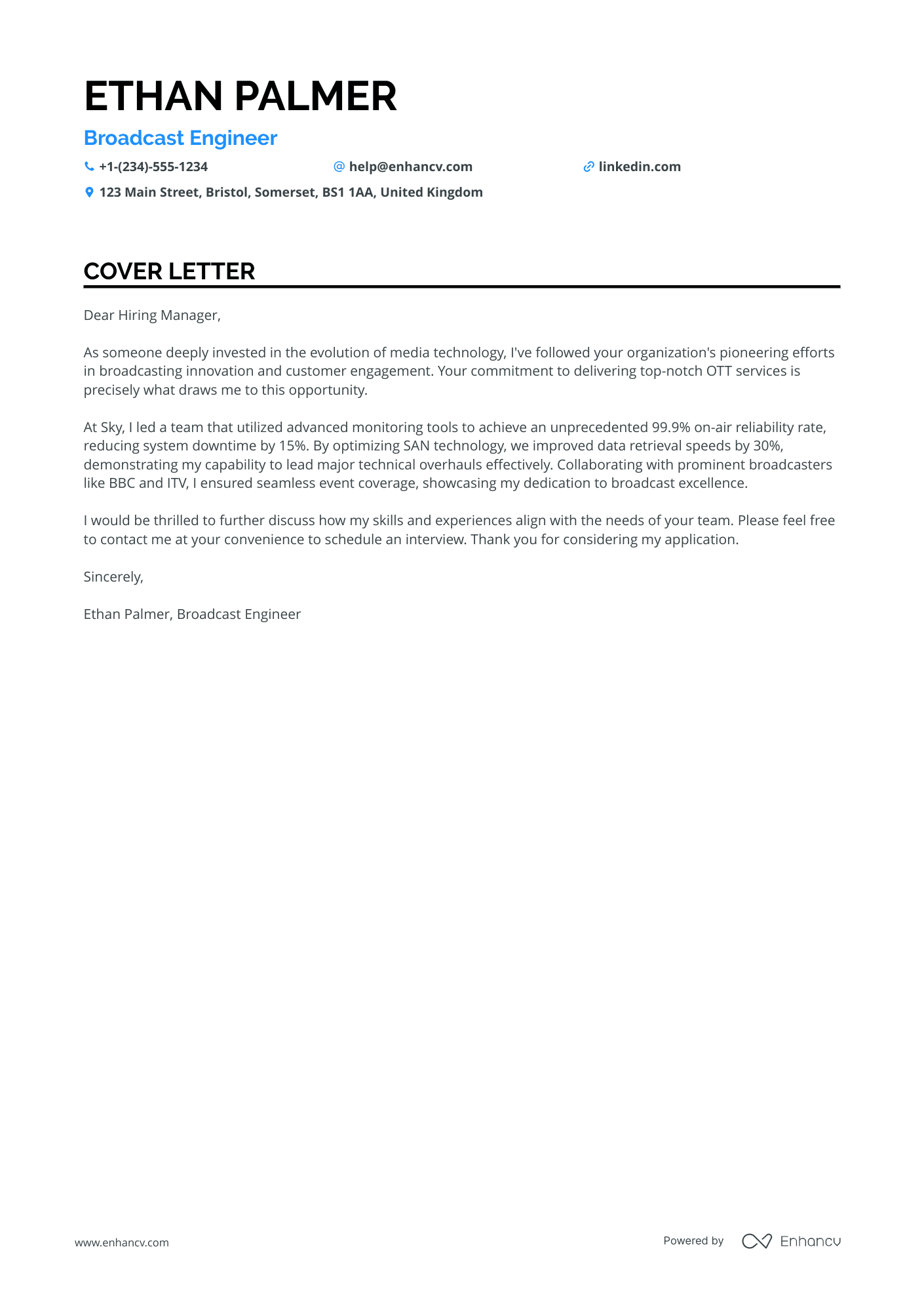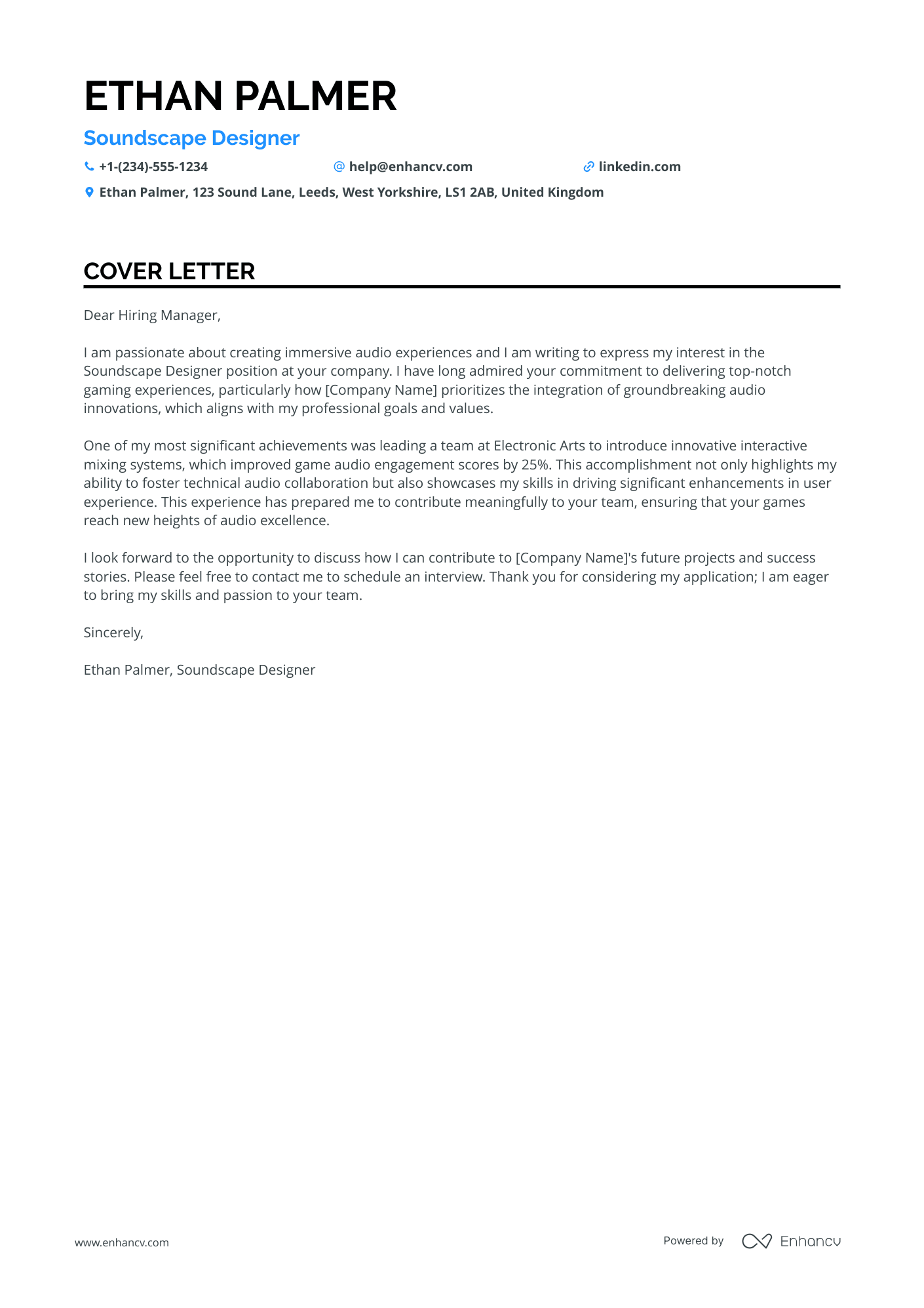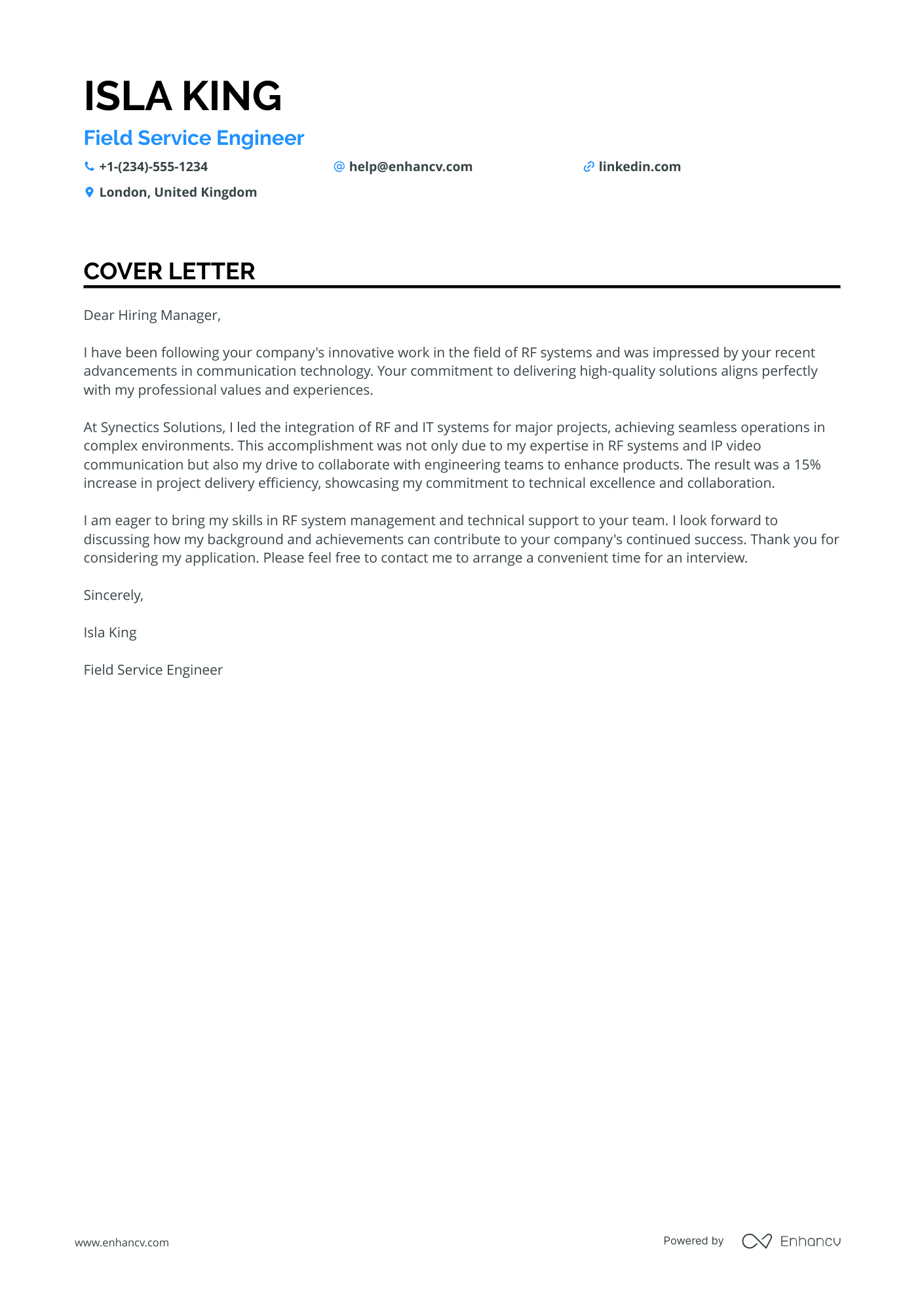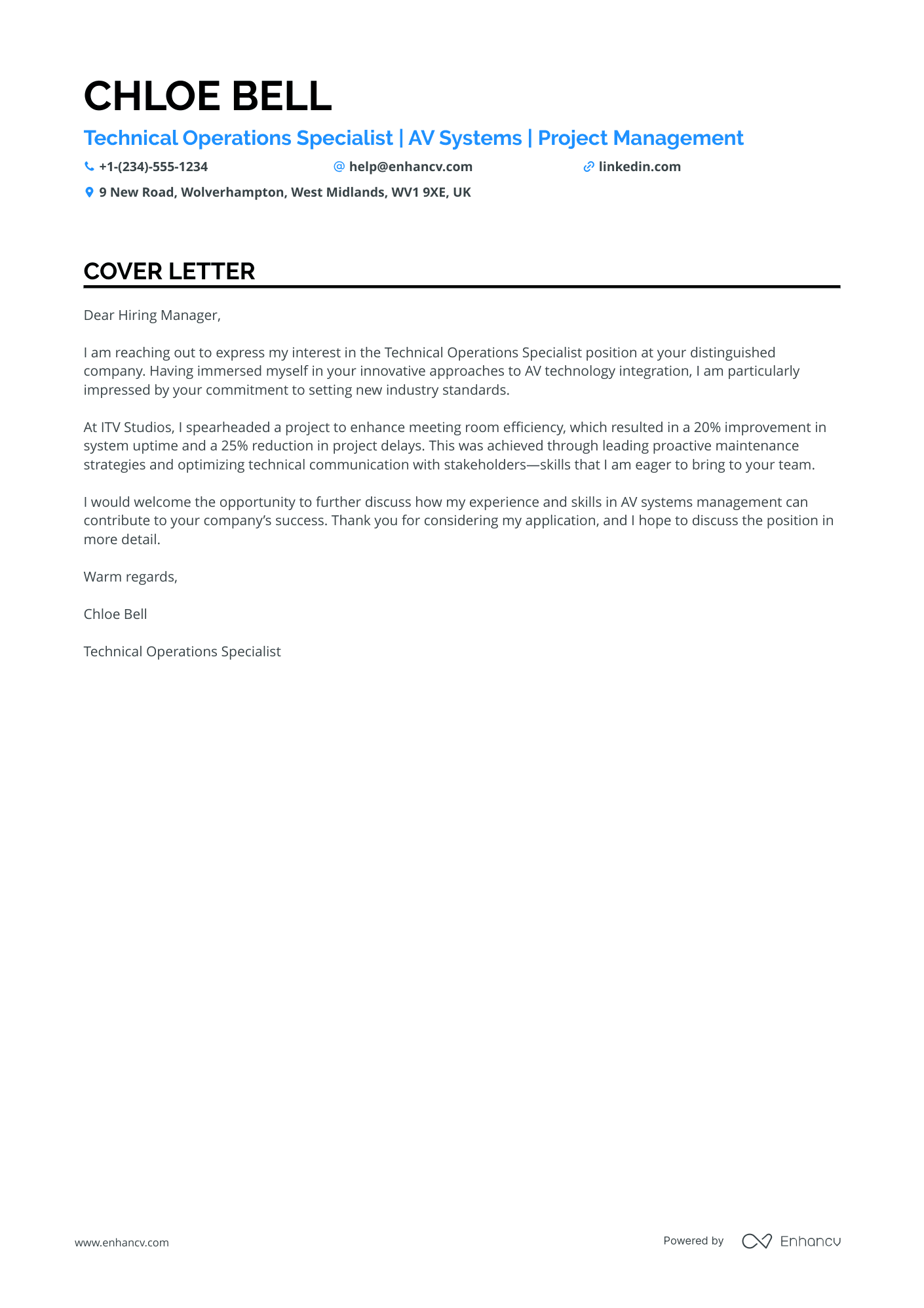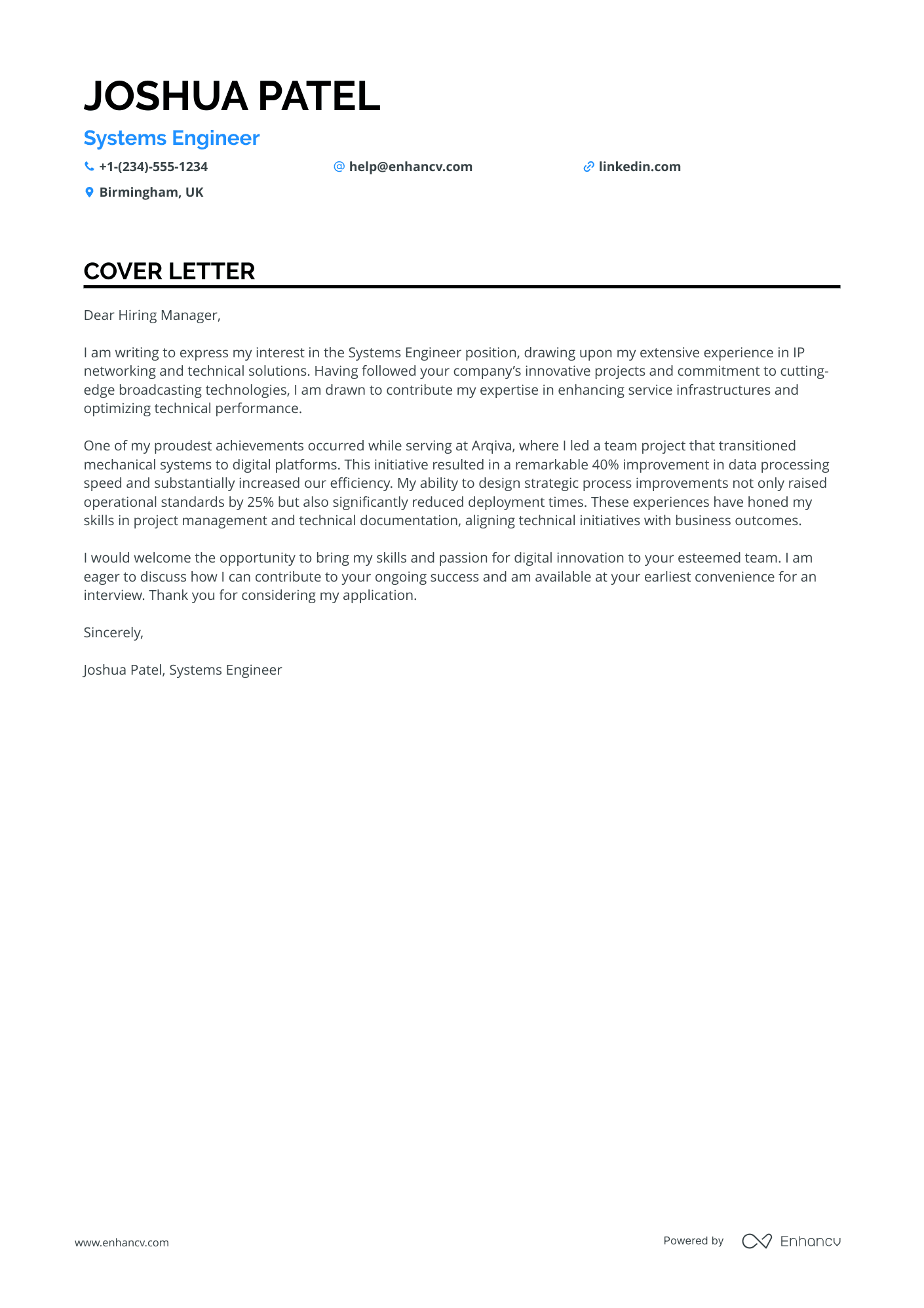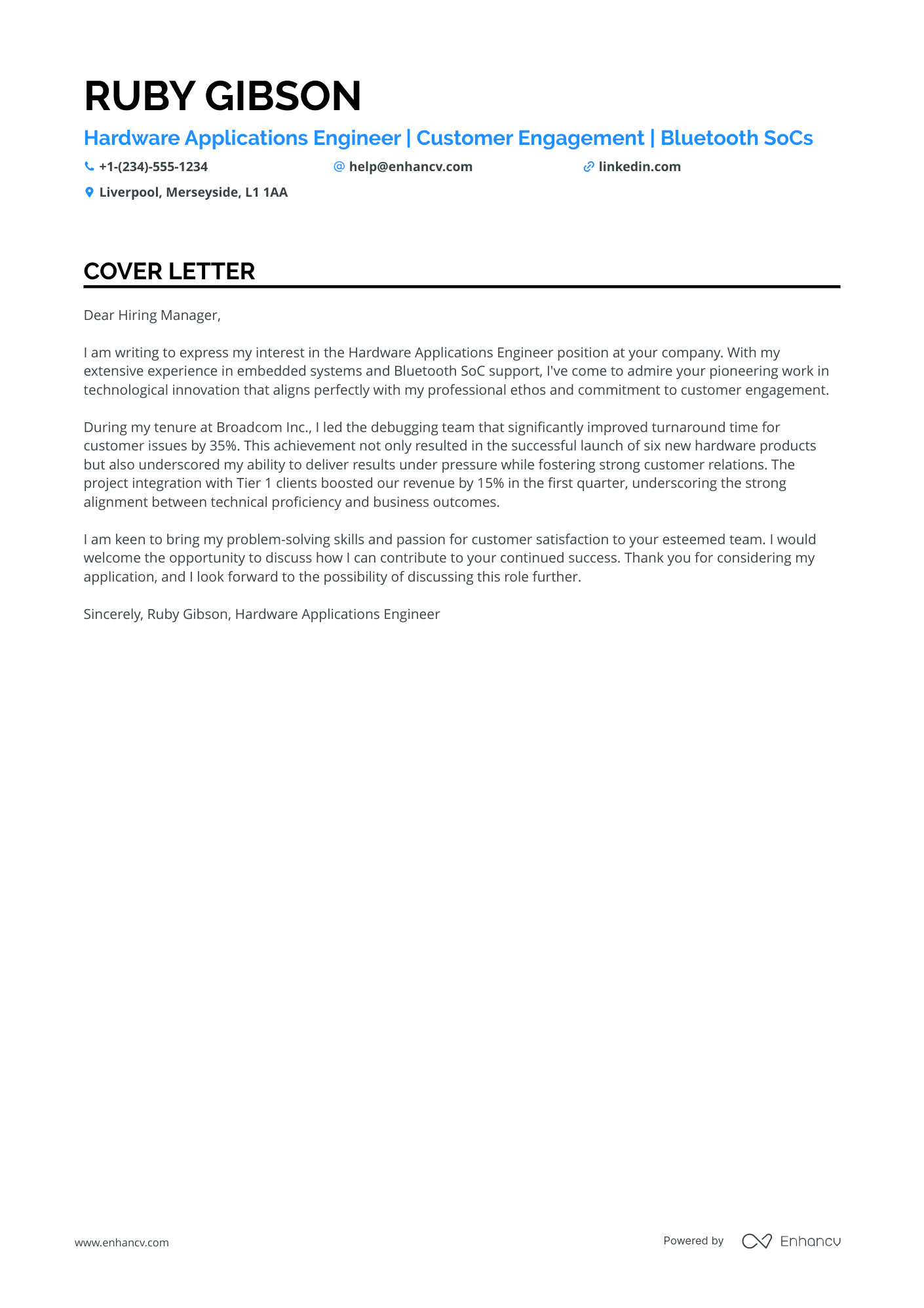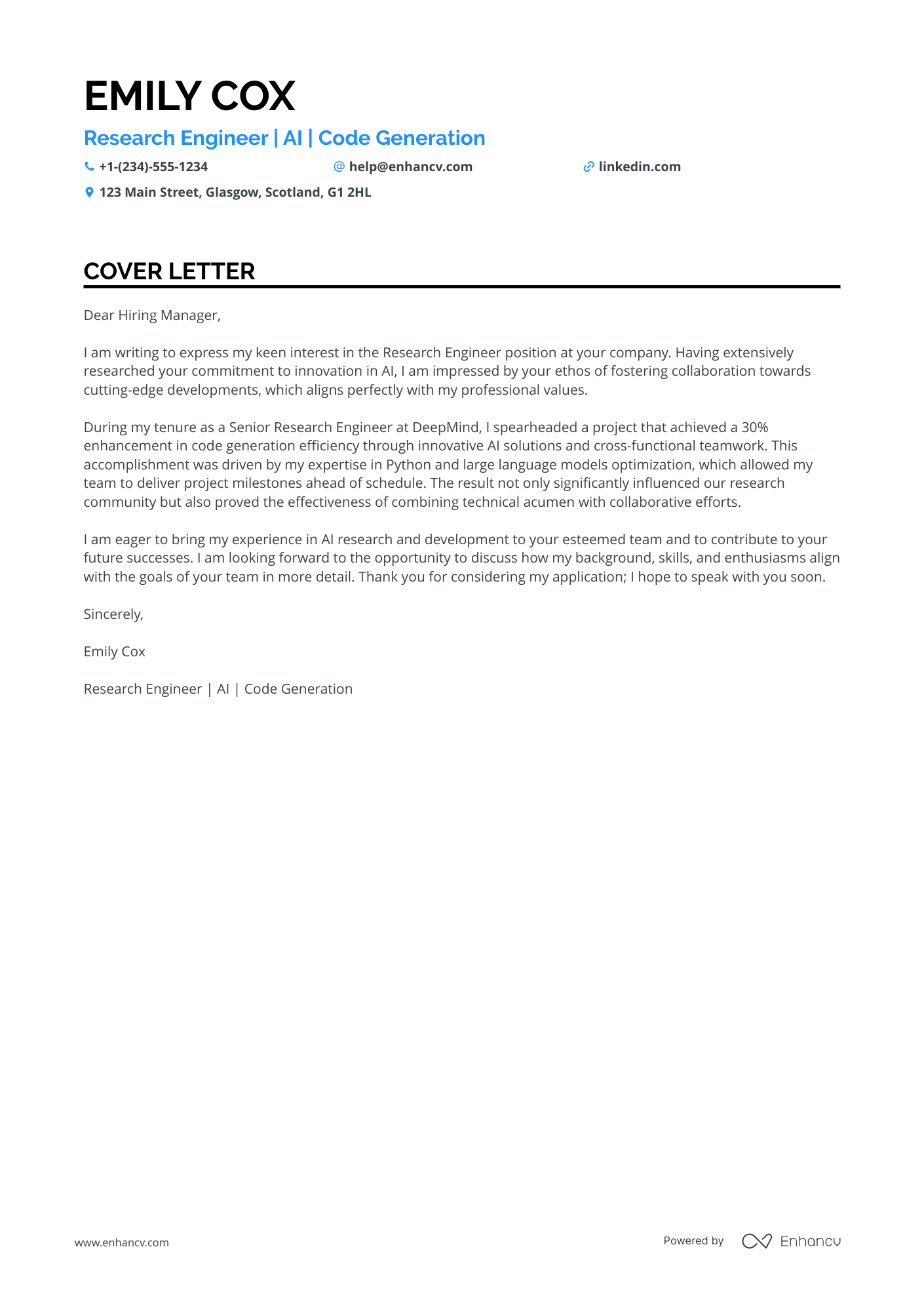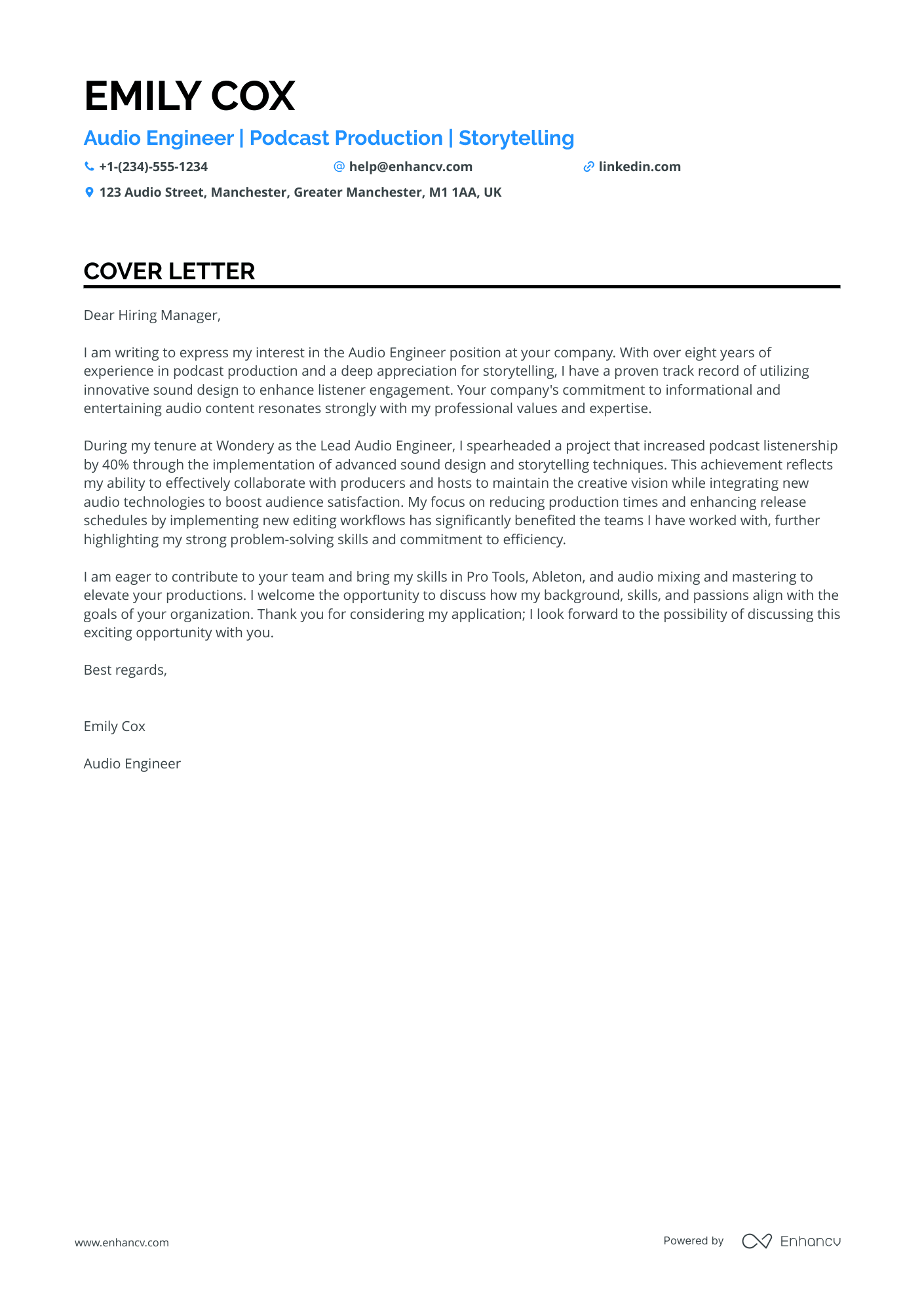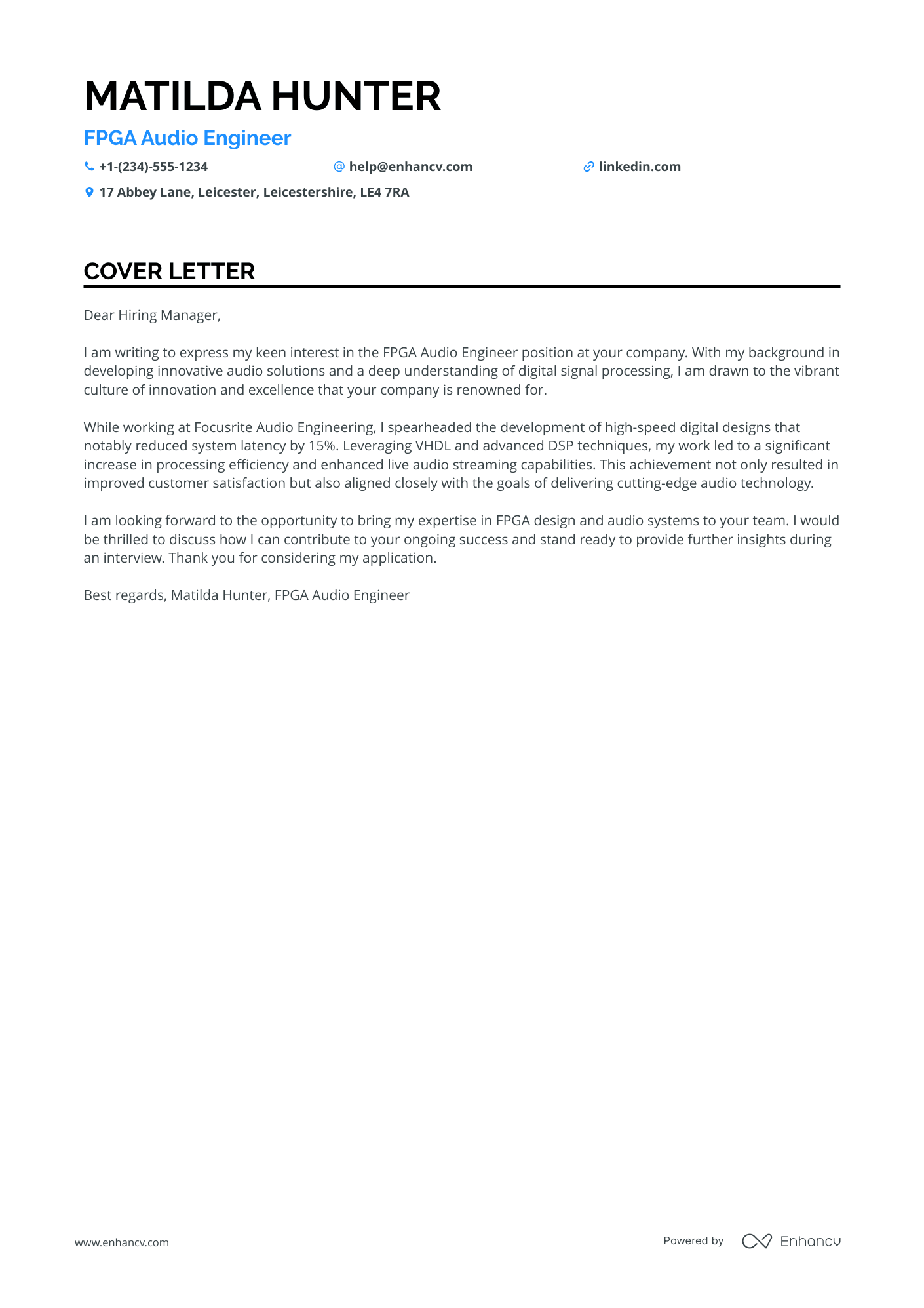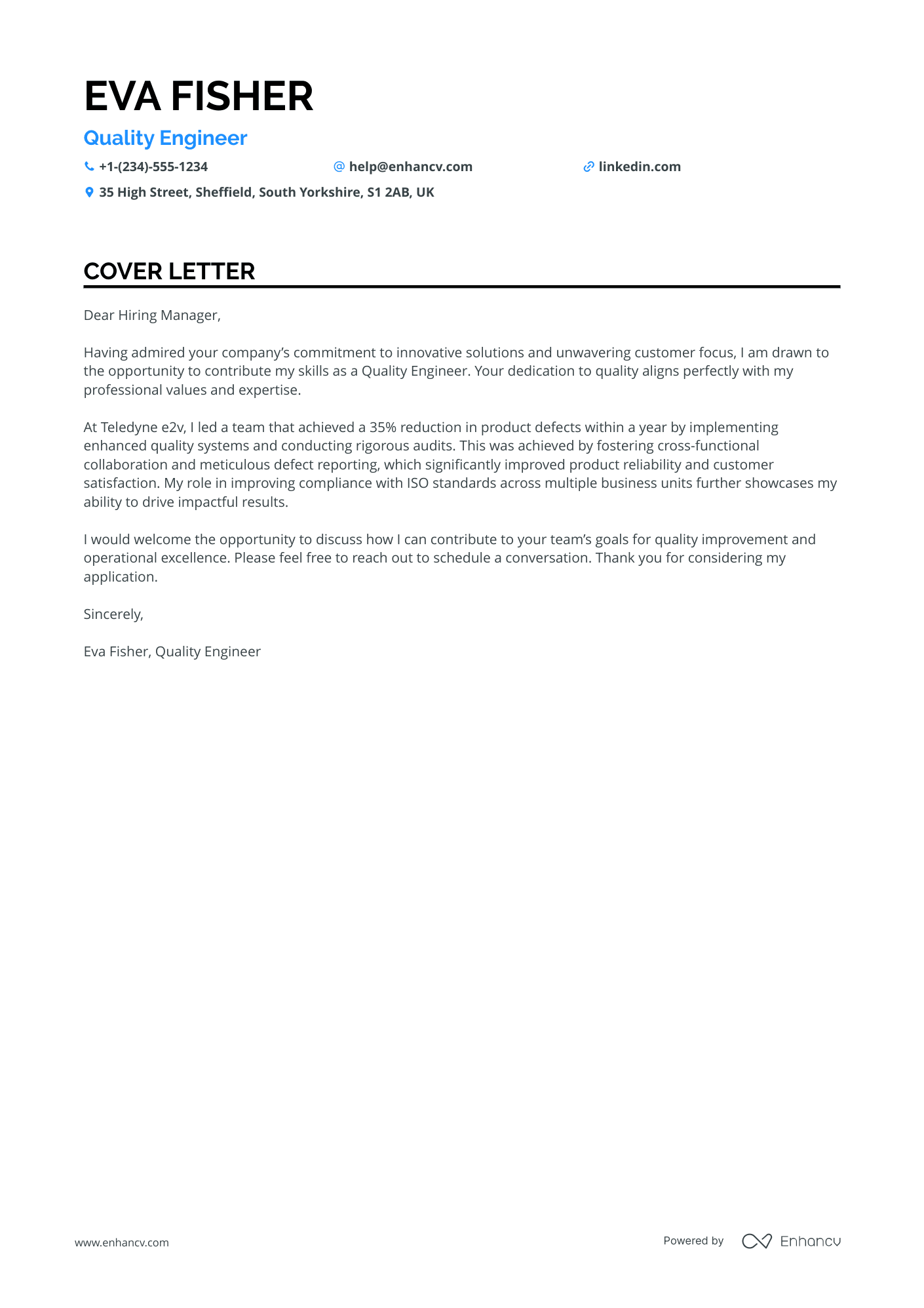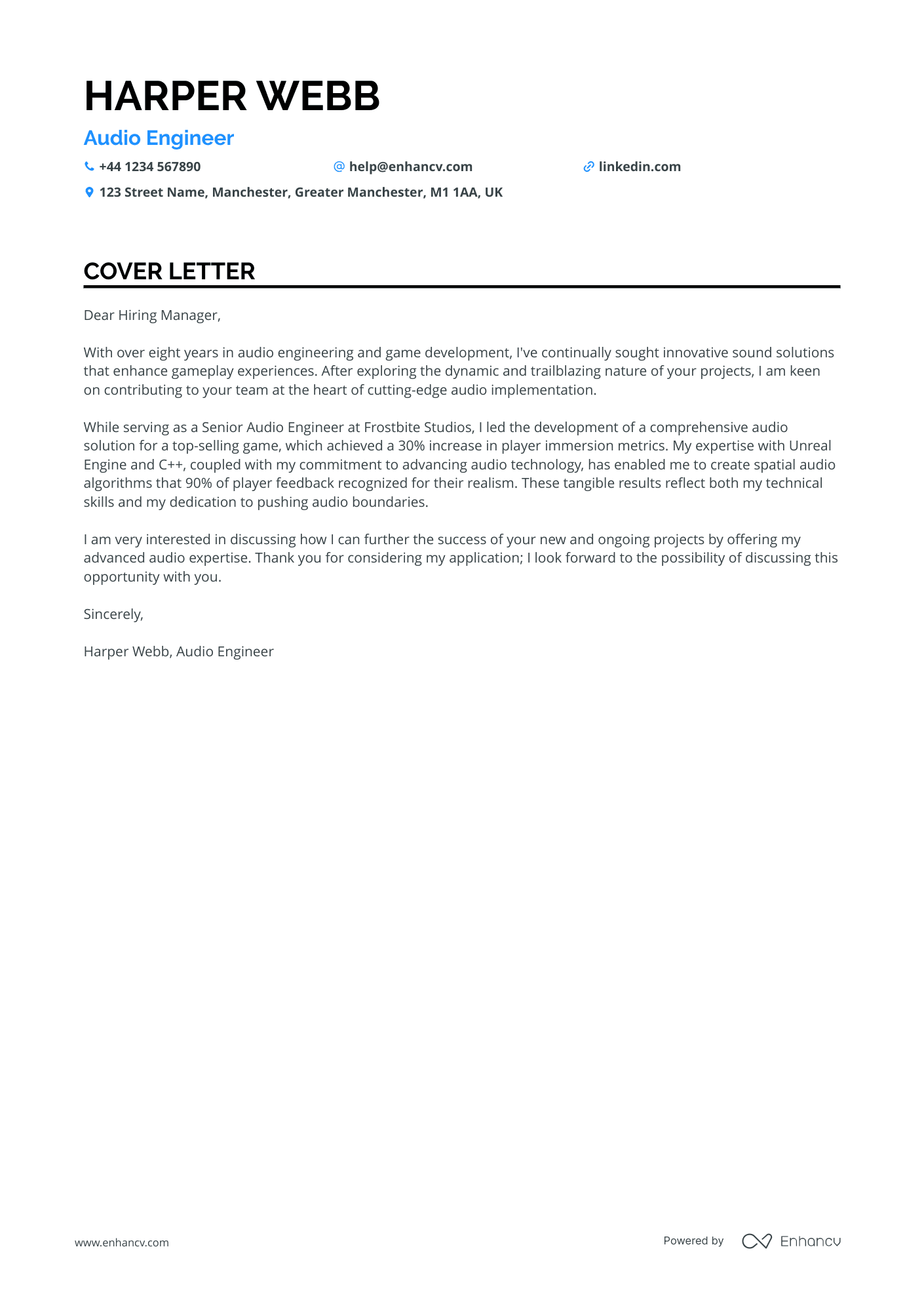You want your cover letter to strike the perfect balance between being professional and showing some personality. But how do you achieve this?
If you write too formally, your tone may come across as stiff. If you're too casual, it may sound overly conversational.
While modesty is always valued, how can you confidently present your skills without sounding arrogant or boastful?
This guide will help you find the right balance, ensuring your cover letter is both professional and personable, while focusing on the key job requirements.
Cover letter examples for audio engineer
By Experience
Senior Audio Engineer
- Highlighting Technical Expertise: The applicant effectively showcases their expertise in C/C++ and Linux development, which are crucial skills for a Senior Software Engineer specialising in IPTV solutions.
- Quantifiable Achievements: The cover letter includes specific accomplishments, such as a 30% increase in product efficiency and a 98% reliability score, to illustrate the candidate's impact in past roles.
- Leadership and Mentoring: Demonstrating leadership through team management and mentoring capabilities adds significant value, as it points to their ability to guide and improve team performance.
- Industry-Relevant Passion: The mention of passion for video streaming technologies aligns well with the role, illustrating a genuine interest in the field that can drive continued success and innovation.
Junior Audio Engineer
- Emphasising certifications such as the Pro Tools Certified User and Advanced Audio Editing Techniques, showcasing relevant expertise and commitment to professional development in audio editing.
- Highlighting a track record of improving client satisfaction and delivery times, evidenced by a specific 20% increase, which indicates efficiency and reliability in managing client projects.
- Detailing practical experience with technical troubleshooting and IT issue resolution, crucial for roles involving complex studio environments and audio equipment management.
- Demonstrating leadership and collaborative skills through successful team workshops and training sessions, enhancing overall team performance and skill competence.
Lead Audio Engineer
Emphasising leadership roles, such as leading a team to complete 15 large-scale projects annually, showcases an ability to manage and guide teams effectively, which is critical for senior roles in audio visual engineering.
Highlighting the Certified Technology Specialist (CTS) certification demonstrates credibility and expertise in the industry, important for a specialised field such as AV and networking.
Showcasing innovation and problem-solving skills, such as reducing LED wall downtime by 40% and saving substantial costs, positions the candidate as a proactive and value-driven professional.
Detailing achievements like being awarded Engineer of the Year or leading national-level projects lends authority and serves as a testament to competency and excellence in the field.
Entry Level Audio Engineer
- Highlighting leadership and team management: The cover letter effectively showcases the candidate's ability to lead large teams of audio volunteers, enhancing operational efficiency and boosting volunteer retention, which is crucial for roles in dynamic environments like church ministry.
- Emphasising technological advancements: The candidate's initiative in implementing new audio technologies, which resulted in cost reductions and improved sound quality, demonstrates technical proficiency and cost-effective problem-solving skills vital for an Audio Engineer.
- Showcasing educational background: Referencing advanced studies, such as a Master of Science in Sound Design from the University of Edinburgh, adds credibility and signals a robust foundational understanding of sound design principles.
- Incorporating measurable achievements: Citing specific metrics, such as a 50% enhancement in sound performance and a 99% operational uptime, provides quantifiable evidence of the candidate's impact and effectiveness in the role.
Experienced Audio Engineer
- Highlighting the candidate's experience with prestigious companies such as Marshall Amplification, Yamaha Music Europe, and Roland Corporation showcases industry relevance and expertise in audio technology.
- Emphasising experience with specific technologies like ADC/DAC, DSPs, and microcontrollers signals proficiency with critical tools and systems important for audio electronics roles.
- Noting leadership in project management and ability to pioneer process improvements and innovations indicates valuable skills in driving advancements and enhancing team productivity, crucial for a senior engineer role.
- Mentioning accomplishments such as significant revenue growth and reductions in manufacturing costs demonstrates the candidate's direct impact on business success and market competitiveness.
Principal Audio Engineer
- Relevant Experience: Highlighting 7 years in audio engineering with specific roles at renowned companies showcases expertise and credibility pertinent to the Senior Audio Engineer role.
- Impact and Achievements: Clearly describing quantifiable achievements, such as a 50% increase in user engagement due to spatial audio technology integration, underscores the candidate's contribution to previous projects.
- Technical Proficiency: Mentioning skills like DAW plugins, Spatial/3D Audio, and VR/AR technologies indicates the technical prowess necessary for developing audio features and enhancing user experiences.
- Education and Training: Listing a Master's in Music Technology accompanied by relevant courses reinforces specialisation and up-to-date expertise in cutting-edge audio technologies.
Assistant Audio Engineer
- Highlight Relevant Experience: Emphasising previous roles like "Audio Technician" and "Post-Production Coordinator" aligns well with the technical and collaborative aspects required in similar roles, showcasing a solid background in audio production and project management.
- Emphasise Quality Assurance Skills: The cover letter effectively underscores quality assurance skills that led to notable improvements, such as a 35% increase in error detection, which is crucial for roles involving attention to detail in audio production.
- Certifications and Courses: Mentioning the "Advanced Audio Editing Techniques" course and "Project Management for Audio Tech" certification highlights ongoing professional development, demonstrating commitment to enhancing specific skill sets relevant to the industry.
- Showcase Achievements and Impact: Highlighting achievements such as a 30% reduction in defect rate and award-winning projects, emphasizes the candidate’s capacity to deliver high-quality results and contribute to team success.
Freelance Audio Engineer
- Emphasise significant achievements, such as a 30% increase in listener engagement, which demonstrates effective content production skills.
- Highlight relevant work experiences, including roles at reputable organisations like BBC Radio, which lend credibility and showcase industry expertise.
- Mention specific technical skills, such as proficiency in Adobe Audition, crucial for audio-based roles and can set you apart from other candidates.
- Underline educational background in journalism, particularly advanced degrees, to establish foundational and specialised knowledge relevant to the role.
By Role
Live Sound Audio Engineer
- Certifications and Courses: Highlighting specific certifications or advanced workshops, such as the "Digital Sound Design Certification" and "Advanced Sound Engineering Workshop," demonstrates ongoing education and specialisation in sound engineering.
- Technical Skills: Emphasising expertise in specific equipment, like "Alan and Heath Desk Management," shows technical competency that is crucial for sound engineering roles in live entertainment.
- Achievements and Impact: Mentioning quantifiable improvements in event audio quality, such as a "30% increase in positive audience feedback," provides tangible evidence of past success and effectiveness in the role.
- Diverse Experience: Highlighting experience in different settings, from "theatrical spoken word to full band sets," illustrates versatility and adaptability in various live entertainment scenarios.
Post Production Audio Engineer
- Highlighting Advanced Technical Skills: The cover letter effectively emphasises the candidate's proficiency in Python programming and audio processing techniques, crucial for roles in audio engineering and sound design.
- Industry Recognition: Mentioning awards and recognitions, such as the national innovation award, strengthens the candidate's credibility and validates their contributions to the field.
- Emphasis on Research and Publications: The inclusion of published papers and industry collaborations showcases expertise and a commitment to ongoing development and sharing of knowledge in audio engineering.
- Focus on Leadership Experience: Demonstrating leadership through positions such as leading a development team and managing sound solutions delivery enhances the candidate's profile for roles requiring team coordination and project management.
Broadcast Audio Engineer
- Emphasise Industry-Specific Certifications: Highlighting certifications such as the "Advanced Broadcast Systems Certification" and "Professional Video Over IP Course" demonstrates specialised knowledge crucial for broadcast engineering roles.
- Key Achievements and Metrics: Include quantifiable achievements such as leading optimisations that increased broadcast efficiency by 20% or achieving 99.9% broadcast reliability, as these figures effectively showcase the candidate's impact and success in past roles.
- Relevant Skills and Technologies: Mentioning expertise in MCR operations, VMware, and SAN technologies positions the applicant as a well-rounded candidate with the necessary technical skills desirable for broadcast engineering positions.
- Collaborative Experience with Prominent Broadcasters: Highlighting collaborations with major broadcasters like BBC and ITV adds credibility to the candidate's experience and suggests an ability to handle the demands of high-profile environments.
Studio Audio Engineer
- Highlighting of Awards and Achievements: The cover letter effectively lists significant achievements such as winning 'Best Audio Design', which not only showcases expertise but also establishes credibility and recognition in the field.
- Specific Technical Skills: The mention of mastering Wwise, a popular industry-standard audio middleware, is crucial for demonstrating technical competency, a skill highly valuable in sound design for games.
- Experience with Top Industry Companies: Listing experiences and roles at well-known companies like Electronic Arts, Ubisoft, and Bungie lends great credibility and indicates familiarity with high-stakes, complex projects.
- Quantifiable Results and Improvements: The cover letter includes specific quantitative achievements, such as improving game audio engagement scores by 25%, which clearly illustrates the candidate's direct impact on previous projects.
Field Audio Engineer
- Emphasising Industry-Specific Skills: The cover letter highlights key skills relevant to an RF Systems Engineer, such as RF signals, COFDM RF systems, and modulation techniques, showcasing technical expertise that aligns with the specialised requirements of the role.
- Demonstrating Measurable Achievements: The inclusion of specific achievements such as increasing system efficiency by 20% and boosting customer satisfaction by 30% offers quantifiable evidence of successful past performances and value addition.
- Highlighting Technical Support Experience: The candidate demonstrates extensive technical support experience, particularly in resolving issues quickly and reducing onboarding time, which is crucial for roles that require efficient problem-solving and team integration.
- Mentioning Relevant Education and Training: Citing degrees in Wireless Communication Systems and Electrical Engineering, along with advanced courses in RF Design and network troubleshooting, underlines an academic and practical foundation necessary for the technical demands of this role.
Audio Systems Engineer
- Highlighting Key Certifications: Featuring specialised training such as the "Poly Studio X Configuration Mastery" course emphasises advanced technical capabilities relevant to AV systems, which is crucial for a Technical Operations Specialist role.
- Detailing Measurable Achievements: Providing quantifiable achievements, like reducing support resolution times by 30% and improving system uptime by 20%, effectively demonstrates problem-solving skills and impacts directly related to the role's responsibilities.
- Emphasising Technical and Project Management Skills: Highlighting a blend of technical skills such as AV systems configuration and networking protocols along with project management expertise illustrates competency in managing complex technical projects.
- Focusing on Strong Communication Abilities: Showcasing experience in providing clear technical communication to stakeholders and reducing project delays by 25% underlines effective communication skills necessary for leadership and coordination in technical operations roles.
Audio Software Engineer
- Specific Certifications: Highlighting the Certified IP Network Expert and Broadcast Engineering Certification demonstrates the applicant's specialised knowledge and expertise essential for a Systems Engineer role in IP networking and broadcasting.
- Quantifiable Achievements: The use of concrete metrics such as improving regional reach by 30%, cutting downtime by 15%, and saving £500K annually exemplify measurable success and impact.
- Project Leadership and Collaboration: Emphasising leading cross-functional teams and significant project management instances aligns with the necessary collaborative and leadership skills for a Systems Engineer position.
- Relevant Skills and Experience: Mentioning terrestrial broadcasting, satellite communication, troubleshooting, and project management explicitly relates to the technical and operational skills required in the field.
Audio Hardware Engineer
- Highlighting Industry Expertise: Emphasise years of experience in embedded systems and Bluetooth SoC support, demonstrating a deep understanding of the field which is crucial for a Hardware Applications Engineer role.
- Quantifiable Achievements: Use metrics to showcase impact, such as reducing debug time by 40% and increasing market penetration by 20% through successful project launches.
- Customer-Focused Approach: Stress achievements in enhancing customer experiences and satisfaction scores, highlighting proficiency in customer engagement which is vital for roles involving customer interaction.
- Advanced Technical Skills: Include specialised skills and courses related to the role, such as Embedded C programming and RF Circuit Design, to align with the technical requirements of the position.
Audio Research Engineer
- Highlighting research achievements such as multiple publications in top-tier AI conferences demonstrates a strong academic foundation and thought leadership in the field, which is critical for roles in AI research.
- Emphasising advanced skills in Python and large language models optimisation aligns with the technical requirements often needed in the role of a Research Engineer.
- Mentioning leadership in cross-functional collaborations underscores the ability to lead teams towards achieving significant performance improvements, a valuable trait in senior technical roles.
- Noting participation in specialised courses, like the "Deep Learning Specialisation", shows commitment to continuous learning and staying updated with cutting-edge technologies, which is essential in rapidly evolving fields like AI.
Audio Mastering Engineer
- Highlight the extensive industry experience: Emily's 8+ years of expertise in audio engineering and podcast production is crucial and should be prioritised in the cover letter, demonstrating depth and breadth of knowledge.
- Emphasise specialised skills: Proficiency in key industry tools such as Pro Tools, Ableton Live, and iZotope RX should be emphasised as they are critical for the role and show hands-on capability in audio editing and production techniques.
- Mention specific achievements and projects: Highlighting the increase in podcast listenership by 40%, improvement in production times, and successful training initiatives add concrete, quantifiable evidence of Emily's impact and effectiveness in previous roles.
- Showcase advanced education and certifications: Emphasising the Master of Arts in Audio Production and relevant courses like Advanced Podcast Production from LinkedIn Learning underlines Emily's commitment to continuous professional development and advanced knowledge in the field.
Audio Mixing Engineer
Specific Skills & Expertise: The cover letter effectively highlights skills highly relevant to the FPGA Audio Engineer role, such as proficiency in VHDL, DSP, digital signal processing, and high-speed digital design, ensuring the applicant's qualifications are clear and pertinent.
Quantifiable Achievements: It effectively demonstrates the candidate's impact through quantifiable achievements, like reducing latency by 20% and improving DSP algorithm efficiency by 25%, which strongly supports their experience and success in past roles.
Relevant Experience: The letter underscores relevant professional experiences, such as working with top companies like Focusrite Audio Engineering, and emphasises roles and responsibilities directly applicable to the position applied for.
Alignment with Industry Trends: The inclusion of passions and interests in audio technology and digital electronics aligns the applicant with ongoing trends in the audio engineering field, showcasing their commitment to staying current and innovative within the industry.
Audio Quality Assurance Engineer
- Highlight Specific Certifications: Emphasise the ISO 9001:2015 Lead Auditor certification, essential for roles in quality engineering that require in-depth knowledge of quality management systems.
- Focus on Quantifiable Achievements: Include metrics like "35% reduction in product defects" and "40% improvement in customer satisfaction" to demonstrate effectiveness in previous roles, appealing directly to potential employers.
- Showcase Relevant Experience: Detail experience in implementing and managing ISO and AS9100 quality management systems, which are highly relevant in sectors like aerospace and advanced manufacturing.
- Emphasise Cross-Functional Collaboration: Mention leadership experience in cross-functional teams, highlighting the ability to collaborate across departments to achieve quality improvements.
Audio Engineer cover letter example
Harper Webb
123 Street Name, Manchester, Greater Manchester, M1 1AA, UK
+44 1234 567890
help@enhancv.com
- Highlight Relevant Experience: Mentioning over eight years in audio engineering and game development helps establish credibility and expertise in the field, which is crucial for specialized roles.
- Emphasize Technical Skills: Discussing proficiency with Unreal Engine and C++ underscores the technical skills sought by employers in audio engineering roles in the gaming industry.
- Showcase Achievements: Quantifying accomplishments, such as increasing player immersion metrics by 30%, provides concrete evidence of the impact and value that you can bring to the role.
- Align with Company Vision: Expressing enthusiasm for the company's dynamic and trailblazing projects indicates an alignment with their innovative goals and culture, which is attractive to hiring managers.
Importance of cover letters in the United Kingdom
A well-crafted cover letter can significantly strengthen your job application by emphasising why you’re an ideal fit.
Here are some reasons why it matters:
- Personalisation: Employers expect your cover letter to demonstrate how your skills and experience align with the company’s needs and/or values.
- Addresses what is omitted from your CV: If your career path includes gaps or changes, your cover letter is the best place to address these positively and explain their relevance.
- Opportunity to stand out: Many applicants have similar qualifications, so a tailored cover letter can show your unique attributes and experience.
What UK employers expect from a cover letter
Your UK employers will appreciate your application if you've taken the effort to tailor your cover letter to their job requirements.
Here’s how to ensure yours ticks all the right boxes:
- Research the company thoroughly: It's not enough to have only read the job advert. Look into the company's history, products, services, and recent achievements to demonstrate your genuine interest and knowledge.
- Connect with the company’s values: Every company has core principles that shape its culture and operations. Identify these values and use your cover letter to show how they align with your professional conduct and ethics.
- Emphasise your relevant skills: Highlight specific skills that match the job description and are most in demand. Use examples from your previous experience to support your claims and set yourself apart from other candidates.
How to format a audio engineer cover letter
Your cover letter is your opportunity to make a strong impression, so its structure must be professional and clear.
Here's an overview of how a UK cover letter should be structured:
- Begin with your address and contact details at the top.
- Include the employer’s name and address directly below.
- Add the date to the left or right of the page.
- Use an appropriate greeting, such as 'Dear Mr Smith' or 'Dear Sir/Madam.'
- Open with a strong introductory paragraph.
- Develop your points in the middle paragraphs, focusing on relevant skills and experience.
- Close with a concise conclusion, reiterating your interest and suitability for the role.
- Sign off formally with your name and signature.
The software used to match your profile to the job, Applicant Tracking Systems (ATS), won’t scan your cover letter. Instead, the cover letter reads as a more personalised note to the recruiter.
When it comes to choosing a font, consider modern options like Lato, Rubik, or Chivo, which should also be applied to your CV to maintain a consistent appearance.
Additionally, your cover letter should be single-spaced with 1-inch (2.5 cm) margins on all sides (our templates are pre-set with these specifications so you can focus on your cover letter content).
Finally, always send your cover letter as a PDF to preserve the formatting and prevent edits.
How to write your audio engineer cover letter salutation
First impressions often start with the greeting and in the case of your job application, 'Dear Sir or Madam' simply won't suffice.
Find out who’s hiring for the role—by calling or emailing the company, searching online, or using LinkedIn—and address them correctly.
Generally, you should address them by their surname (e.g., 'Dear Mrs Weasley'), but if you've spoken to them before, you might use their first name (e.g., 'Dear Albus').
How to write your audio engineer cover letter intro
A great option to begin your cover letter is by showing recruiters you've done your homework or research.
If the company has won an award or made headlines, congratulate them in your opening sentence, or express how impressed you are.
Provide this achievement as a reason why you admire the company, ensuring your tone remains genuine, sincere, and authentic.
How to write your audio engineer cover letter body
As you reach the body of your cover letter, you might wonder what to write in it.
Our advice? Don’t just copy your CV—choose your greatest achievement and tell its story.
Focus on how you got there using hard and soft skills, describe your involvement, and quantify the results with concrete outcomes.
Remember, recruiters aren’t looking for an epic tale of your career—they want something concise, relevant, and directly addressing their needs.
How to write a closing paragraph
Now we’ve reached the closing paragraph of your cover letter. You might be tempted to end with a simple Yours sincerely, but don’t!
Instead, finish with a promise to enhance the company’s performance metrics (backed by your hard and soft skills), to develop as a professional, or something else that holds significance for the organisation. Whatever you choose, ensure to stand behind your words and be remain sincere.
Don’t forget to include a call to action, encouraging recruiters to suggest the best time to follow up for an interview or update.
Conclusion
A standout cover letter is crucial for making an strong impression in your job search in the UK market. Personalise your letter by addressing it to the hiring manager and aligning your skills with the job description.
Use concrete examples to highlight your greatest achievement and convey your enthusiasm for the position. Finally, ensure that both your cover letter and CV are presented professionally for a consistent application.
